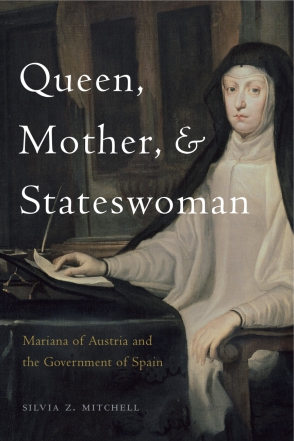Book Talks 2022-2023
Book Talks are designed to give UM faculty with a humanities focus an opportunity to share their recently published books with the community. Faculty generally present on their research and take questions from the audience.
We're back @ Books & Books! (265 Aragon Ave, Coral Gables, FL 33134) Please join us for Book Talks this academic year! Please RSVP for the program to allow for set-up. Programs take place on Monday evenings, starting at 6:30pm.
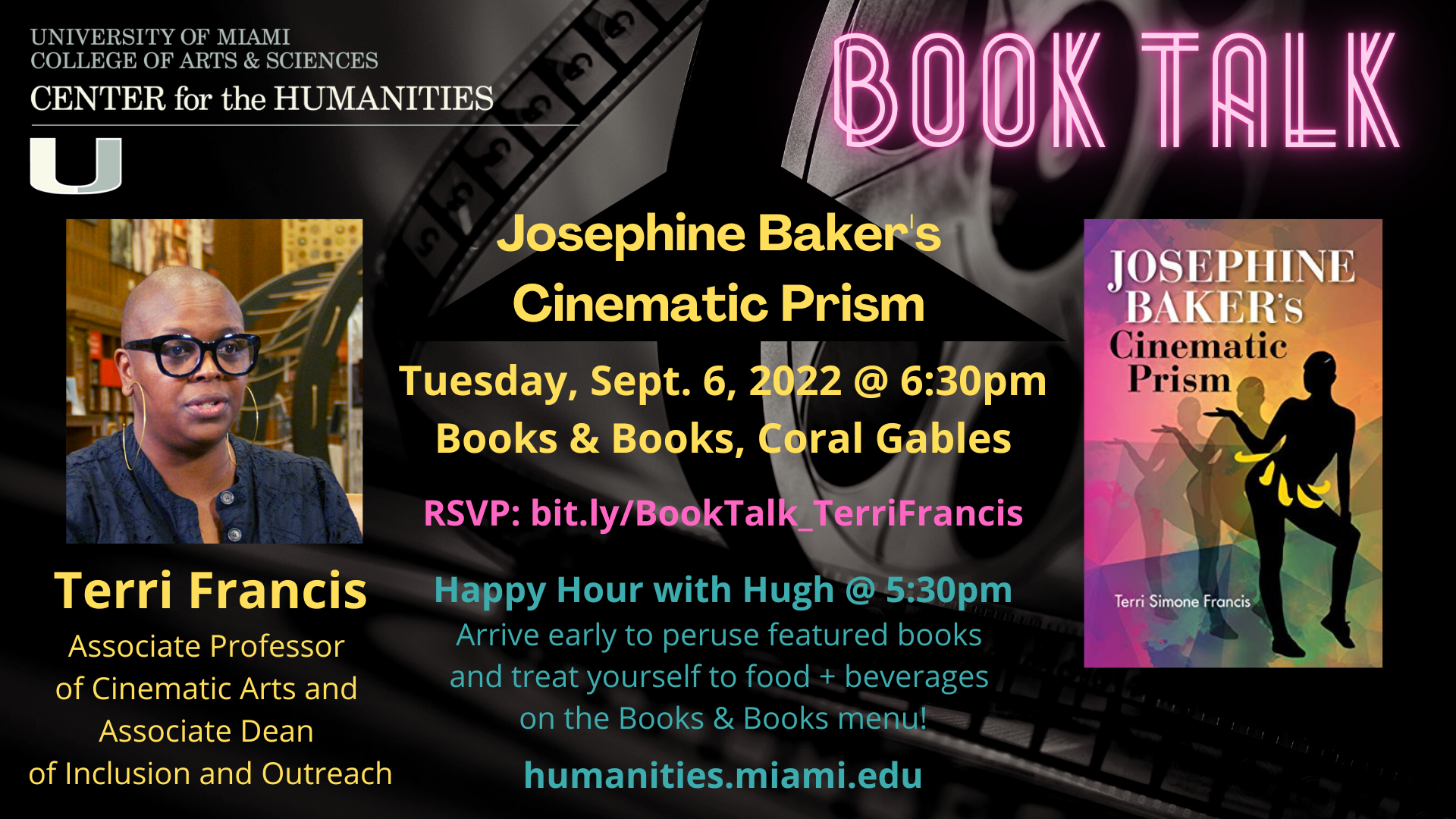
Tuesday, September 6, 2022 at 6:30 PM
Books & Books, Coral Gables
Terri Francis
Associate Professor of Cinematic Arts and Associate Dean of Inclusion and Outreach
University of Miami
Josephine Baker's Cinematic Prism
Josephine Baker, the first Black woman to star in a major motion picture, was both liberated and delightfully undignified, playfully vacillating between allure and colonialist stereotyping.
Nicknamed the "Black Venus," "Black Pearl," and "Creole Goddess," Baker blended the sensual and the comedic when taking 1920s Europe by storm. Back home in the United States, Baker's film career brought hope to the Black press that a new cinema centered on Black glamour would come to fruition. In Josephine Baker's Cinematic Prism, Terri Simone Francis examines how Baker fashioned her celebrity through cinematic reflexivity, an authorial strategy in which she placed herself, her persona, and her character into visual dialogue. Francis contends that though Baker was an African American actress who lived and worked in France exclusively with a white film company, white costars, white writers, and white directors, she holds monumental significance for African American cinema as the first truly global Black woman film star. Francis also examines the double-talk between Baker and her characters in Le Pompier de Folies Bergère, La Sirène des Tropiques, Zou Zou, Princesse Tam Tam, and The French Way, whose narratives seem to undermine the very stardom they offered. In doing so, Francis artfully illuminates the most resonant links between emergent African American cinephilia, the diverse opinions of Baker in the popular press, and African Americans' broader aspirations for progress toward racial equality.
Examining an unexplored aspect of Baker's career, Josephine Baker's Cinematic Prism deepens the ongoing conversation about race, gender, and performance in the African diaspora.
Terri Francis is Associate Professor of Cinematic Arts and Associate Dean of Inclusion and Outreach. Dr. Francis brings twenty years of experience in film exhibition to her role. In Miami, she plans to create events and discussions that explore archives and the moving image based on her explorations of global black film history.
Dr. Francis is the author of Josephine Baker’s Cinematic Prism published by Indiana University Press in 2021. A scholar of Black film history and aesthetics, her writing and curating engages film archives, film feelings, and the vicissitudes of performance and representation within a global perspective. Currently, her introduction to “Josephine Baker, Queen of Paris” is streaming on the Criterion Channel.
Dr. Francis has published her research on Jamaican nontheatrical films as “Sounding the Nation: Martin Rennalls and the Jamaica Film Unit, 1951-1961” in Film History. In 2013, she guest-edited a special section on Afrosurrealism in the journal Black Camera. Her critical essays appear in Transition, Another Gaze, and Salon.com, and she has provided film commentary for National Public Radio.
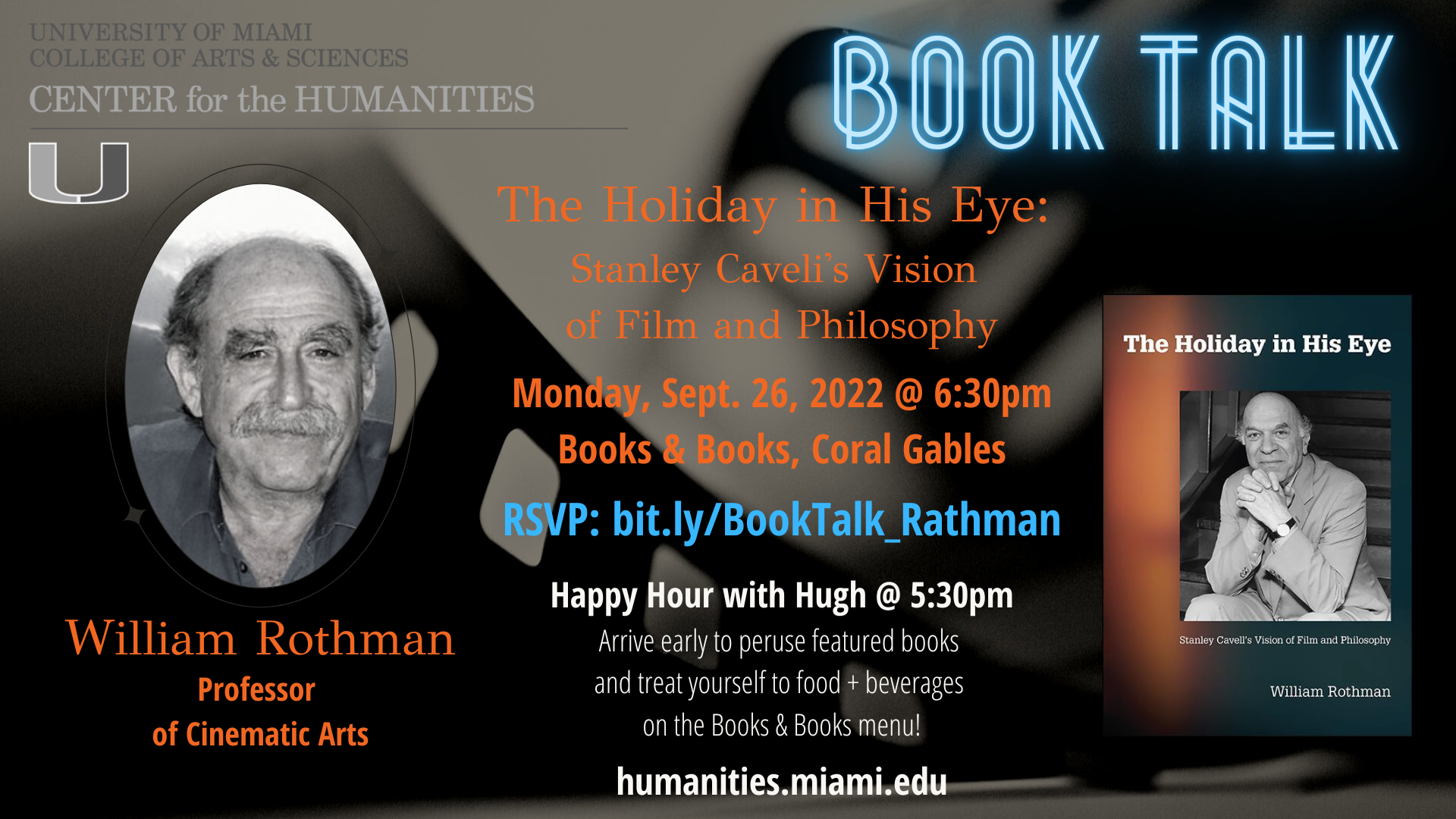
Monday, September 26, 2022 at 6:30 PM
Books & Books, Coral Gables
William Rothman
Professor, Cinematic Arts, School of Communication
University of Miami
The Holiday in His Eye: Stanley Cavell's Vision of Film and Philosophy
Stanley Cavell is widely considered one of the most important modern American philosophers. From The World Viewed to Cities of Words, writing about movies was strand over strand with Stanley Cavell's philosophical work. Cavell was one of the first philosophers in the United States to make film a significant focus of his thought, and William Rothman has long been one of his most astute readers. The Holiday in His Eye collects Rothman's writings about Cavell—many of them previously unpublished—to offer a lucid, serious introduction to and overview of Cavell's work, the influence of which has been somewhat limited by both the intrinsic difficulty of his ideas and his challenging prose style. In these engaging and accessible yet philosophically serious and rigorously argued essays, Rothman presents an original, insightful, and compelling vision of the trajectory of Cavell's oeuvre, one that takes Cavell's kinship with Emerson as inextricably bound up with his ever-deepening thinking about movies.
William Rothman is Professor of Cinema Arts. He received his Ph.D. in Philosophy from Harvard, where he was an Associate Professor in Visual and Environmental Studies (1976-84), and was Director of the International Honors Program on Film, Television and Social Change in Asia (1986-90).
Dr. Rothman was the founding editor and Series Editor of Harvard University Press’s “Harvard Film Studies” series, and for many years was Series Editor of Cambridge University Press’s “Studies in Film.” His books include the landmark study Hitchcock—The Murderous Gaze (1982; expanded edition 2012), The “I” of the Camera (1988; expanded edition 2004); Documentary Film Classics (1997); A Philosophical Perspective on Film (2000); Cavell on Film (2005); Jean Rouch: A Celebration of Life and Film (2007); Three Documentary Filmmakers (2009); Must We Kill the Thing We Love? Emersonian Perfectionism and the Films of Alfred Hitchcock (2014); Looking with Robert Gardner (2016); Tuitions and Intuitions: Essays at the Intersection of Film and Philosophy (2019); and The Holiday in His Eye: Stanley Cavell’s Vision of Film and Philosophy (2021). He has also contributed chapters to more than sixty books and dozens of essays in the major film studies journals, and liner notes and visual essays to Criterion DVDs of classic films. He has given keynote addresses and special invited lectures in over thirty countries in the Americas, Europe, and Asia as well as Australia and New Zealand.
With his wife, Kitty Morgan, Dr. Rothman wrote and co-produced (with the National Film Development Corporation of India) the 35mm feature film Unni (1990), directed by the distinguished Indian director G. Aravindan.

Monday, October 24, 2022 at 6:30 PM
Mihoko Suzuki
Professor Emerita, English
University of Miami
Antigone's Example: Early Modern Women's Political Writing in Times of Civil War from Christine de Pizan to Helen Maria Williams
This book investigates early modern women’s interventions in politics and the public sphere during times of civil war in England and France. Taking this transcultural and comparative perspective, and the period designation “early modern” expansively, Antigone’s Example identifies a canon of women’s civil-war writings; it elucidates their historical specificity as well as the transhistorical context of civil war, a context which, it argues, enabled women’s participation in political thought.
“A beautifully written book by one of the leading experts in the field, this is a major contribution on women’s political texts, one that raises vital questions about the history, genres, and chronologies of European political thought, and one that will shape future debate.”—Amanda Capern, editor, Routledge History of Women in Early Modern Europe
“This is a major work of comparative literary and cultural history. Deeply researched, strikingly illustrated, and cogently argued, the book makes a compelling case for revising Giorgio Agamben’s influential notion of a “state of exception” in the light of women’s subaltern perspectives and persuasively argues for the importance of Machiavelli for women’s political writings. Suzuki’s book illuminates a rich set of women writers’ views of themselves as political counsellors who used their literary skills to evade censorship and thus speak truth to power.”—Margaret W. Ferguson, author, Dido’s Daughters: Literacy, Gender, and Empire in Early Modern England and France
“Expertly written and theoretically rich, this book fundamentally challenges the masculinity of political thought and deepens our understanding of the meaning and impact of civil war. Antigone’s Example is truly a field-defining book by its leading scholar.”—Joanne Wright, author, Origin Stories in Political Thought: Discourses on Gender, Power, and Citizenship; coeditor, Feminist Interpretations of Thomas Hobbes.
Mihoko Suzuki is Professor of English and Cooper Fellow in the Humanities, Emerita at the University of Miami. Her authored and edited books include Metamorphoses of Helen: Authority, Difference, and the Epic; Subordinate Subjects: Gender, the Political Nation, and Literary Form in England, 1588-1688; The Rule of Women in Early Modern Europe; and Debating Gender in Early Modern England, 1500-1700. She served as coeditor of Early Modern Women: An Interdisciplinary Journal and currently coedits Renaissance Quarterly and a book series, New Transculturalisms, 1400-1800.
 for recording!
for recording!
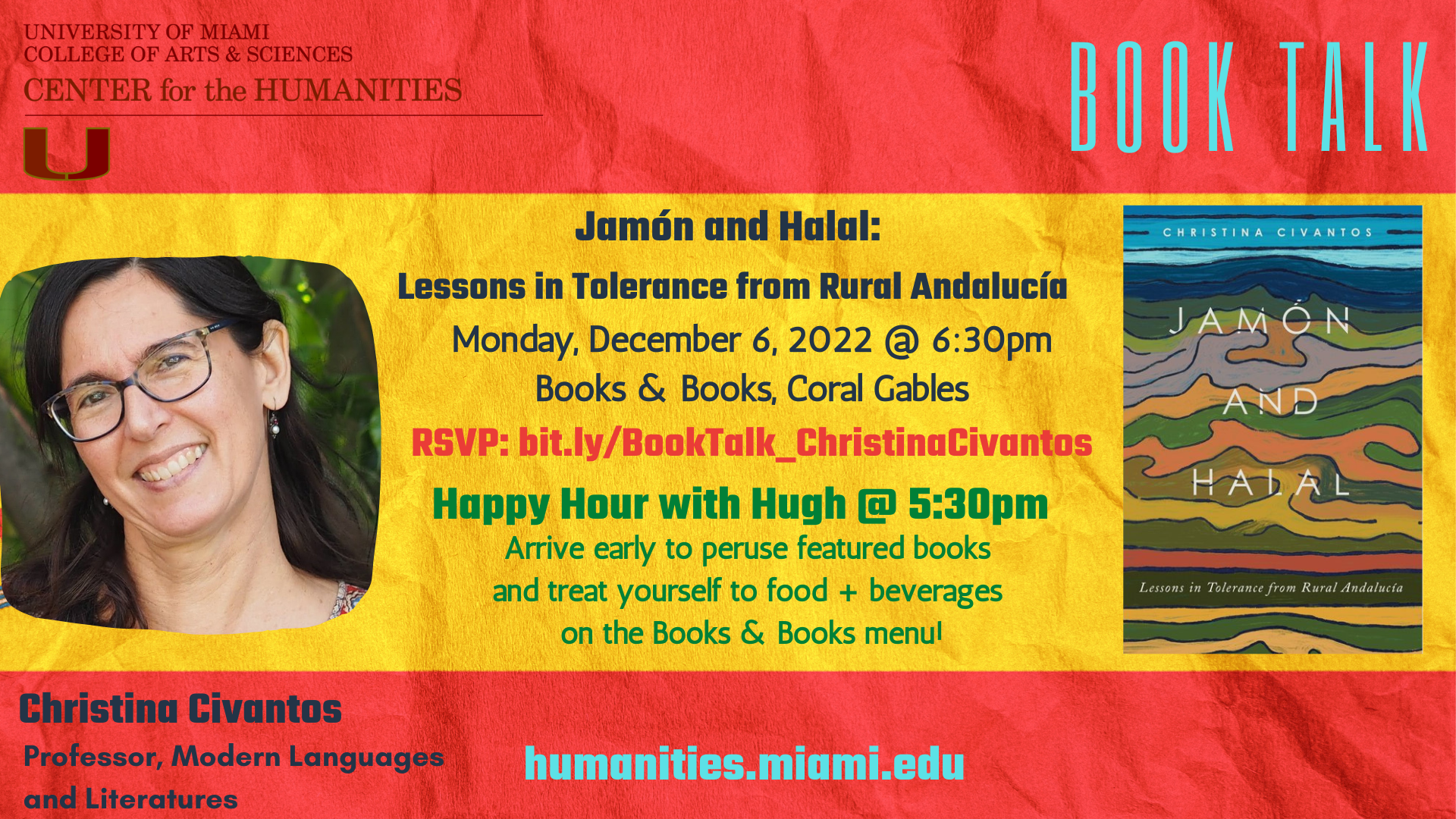
Monday, December 5, 2022 at 6:30 PM
Christina Civantos
Professor, Modern Languages and Literatures
University of Miami
Jamón and Halal: Lessons in Tolerance from Rural Andalucía
Contemporary Spain reflects broader patterns of globalization and has been the site of tensions between nationalists and immigrants. This case study examines a rural town in Spain’s Andalucía in order to shed light on the workings of coexistence. The town of Órgiva’s diverse population includes hippies from across Europe, European converts to Sufi Islam, and immigrants from North Africa. Christina Civantos combines the analysis of written and visual cultural texts with oral narratives from residents. In this book, we see that although written and especially televisual narratives about the town highlight tolerance and multiculturalism, they mask tensions and power differentials. Toleration is an ongoing negotiation and this book shows us how we can identify the points of contact that create robust, respect-based tolerance.
Christina Civantos is in Modern Languages and Literatures at the University of Miami. She is the author of Between Argentines and Arabs: Argentine Orientalism, Arab Immigrants, and the Writing of Identity (SUNY) and The Afterlife of al-Andalus: Muslim Iberia in Contemporary Arab and Hispanic Narratives (SUNY).
 for recording!
for recording!
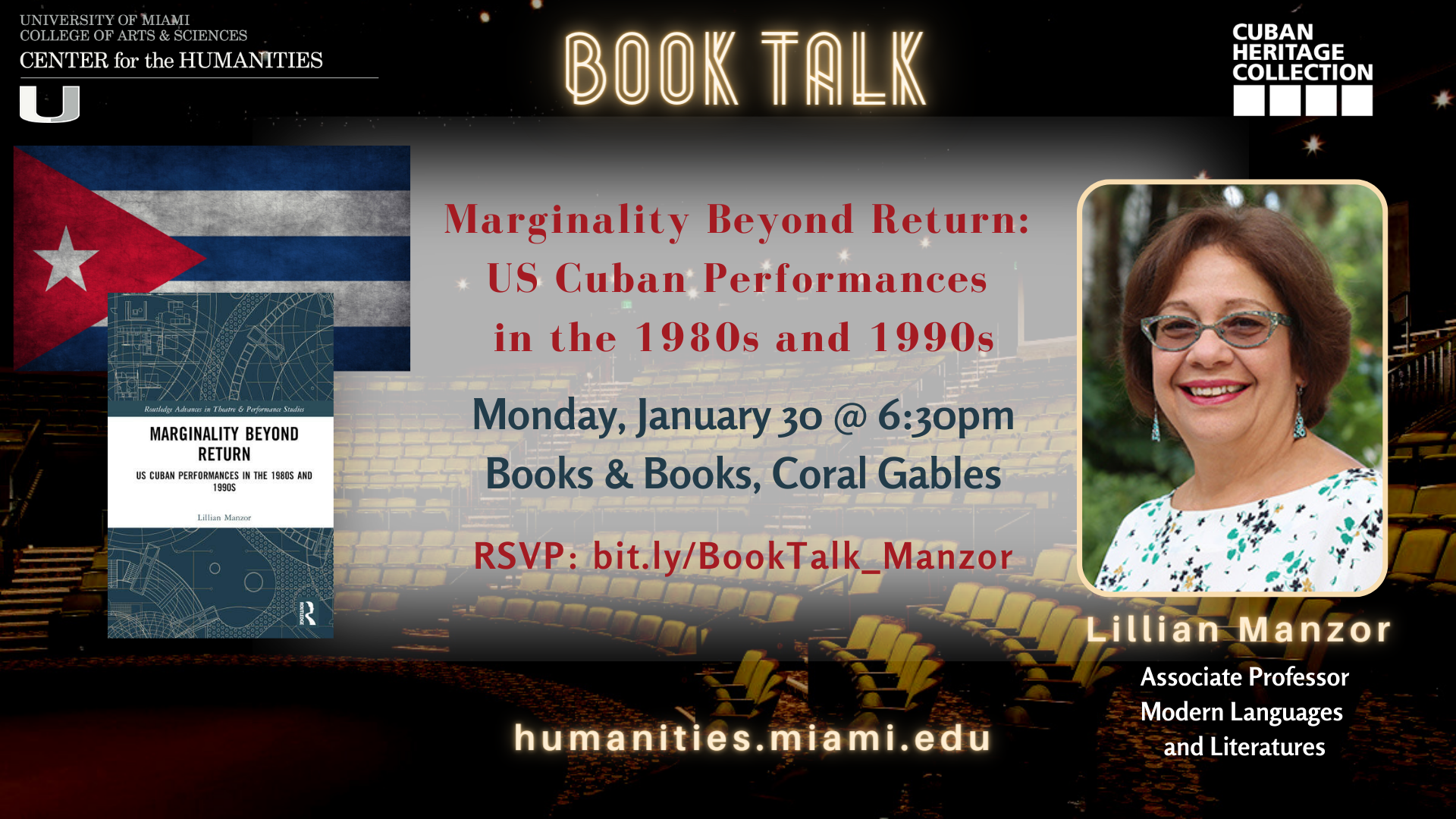
Monday, January 30, 2023 at 6:30 PM
Lillian Manzor
Associate Professor, Modern Languages and Literatures
University of Miami
Marginality Beyond Return: US Cuban Performances in the 1980s and 1990s
Lillian Manzor analyzes early plays by Magali Alabau, Jorge Ignacio Cortiñas, María Irene Fornés, Eduardo Machado, Manuel Martín Jr., and Carmelita Tropicana as well as these playwrights’ participation in three foundational Latine theater projects --INTAR’s Hispanic Playwrights-in-Residence Laboratory in New York (1980-1991), Hispanic Playwrights Project at South Coast Repertory Theater in Costa Mesa, CA (1986-2004), and The Latino Theater Initiative at Center Theater Group's Mark Taper Forum in Los Angeles (1992-2005). She also studies theatrical projects of reconciliation among Cubans on and off the island in the early 2000s. Demonstrating the foundational nature of these artists and projects, the book argues that US Cuban theater problematizes both the exile and Cuban-American paradigms. By investigating US Cuban theater, the author theorizes via performance, ways in which we can intervene in and reformulate political and representational positionings within the context of hybrid cultural identities.
Lillian Manzor is an associate professor of Modern Languages and Literatures at the University of Miami's College of Arts and Sciences, Faculty lead for Latin American and Caribbean Research at the University of Miami Institute for Advanced Study of the Americas, USA, and founding director of the Cuban Theater Digital Archive.
This program is co-sponsored by the Cuban Heritage Collection, University of Miami Libraries.
 for recording!
for recording!

Monday, Februrary 27, 2023 at 6:30 PM
Donald Spivey
Distinguished Professor and Cooper Fellow, College of Arts and Sciences
University of Miami
Racism, Activism, and Integrity in College Football: The Bates Must Play Movement
It was a front-page story in the New York Times that New York University decided to honor seven students who, sixty years earlier, the University disciplined and punished. The Bates 7, as the protest leaders became known, took constructive action when rumors spread in the fall of 1940 that black star running back Len Bates was going to be left behind when the football team ventured down to Columbia, Missouri to play the University of Missouri Tigers. They heard that Missouri invoked the gentlemen's agreement and would not allow an interracial sporting event in Columbia. The protests grew in size, eventually numbering thousands of protesters, and impacted collegiate athletics throughout the nation. The Bates 7 protest made a significant contribution to the national civil rights movement that would follow.
This is the first and only book-length account of the protests that occurred at NYU that helped to change college sports forever. It is the story of Len Bates and the seven brave students who did not compromise in their fight against Jim Crow in college football. The study is based on extensive and exclusive interviews with Len Bates and the Bates 7 and in-depth research into the movement and the era.
Donald Spivey is Distinguished Professor of History at the University of Miami and Special Advisor to the President on Racial Justice. He is the author or editor of ten books, including the award winning If You Were Only White: The Life of Leroy "Satchel" Paige.
 for recording!
for recording!
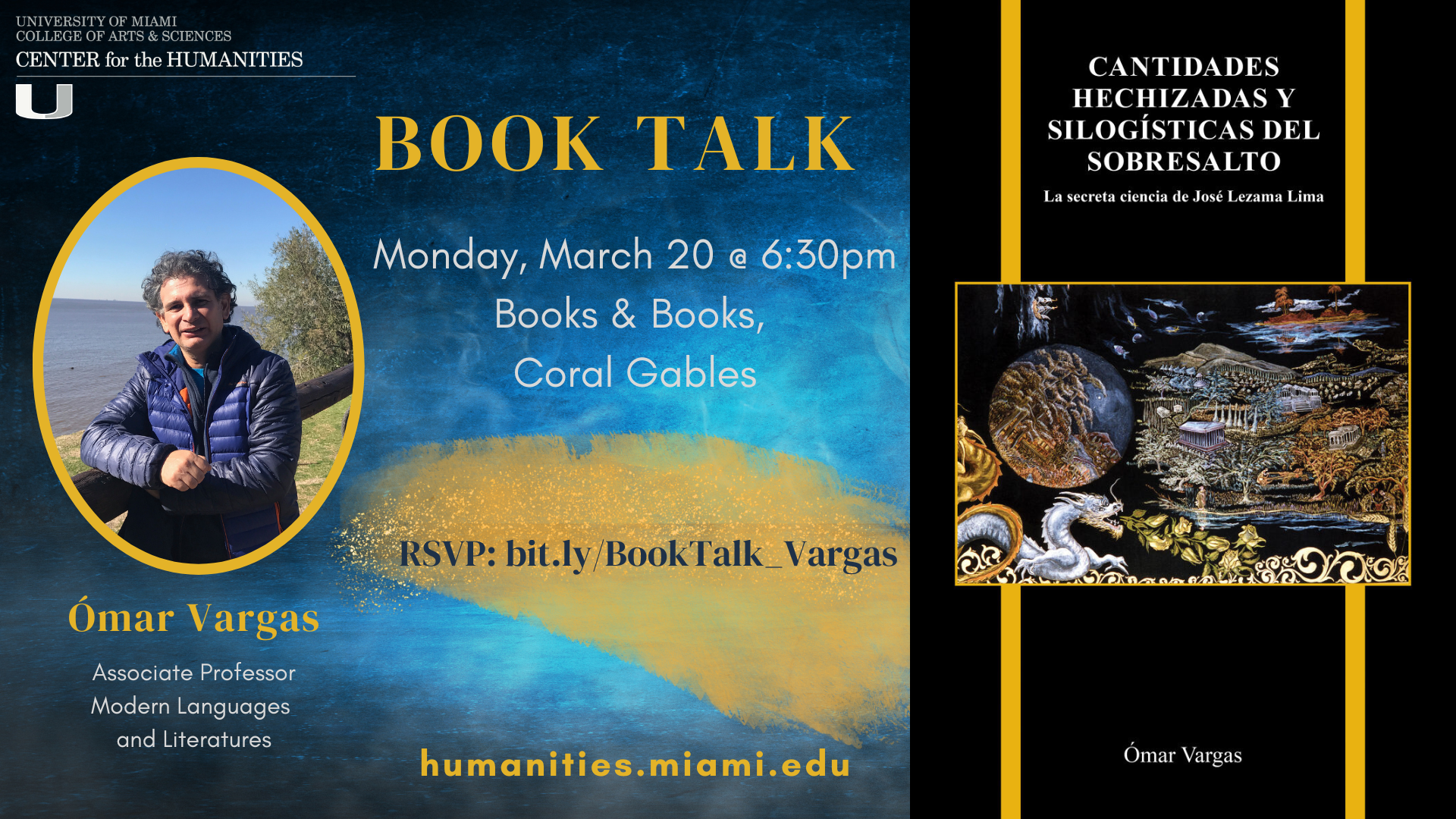
Monday, March 20, 2023 at 6:30 PM
Omar Vargas
Associate Professor, Modern Languages and Literatures
University of Miami
Cantidades Hechizadas y Silogísticas del Sobresalto: La Secreta Ciencia de José Lezama Lima
Arguably the most important Cuban writer of the twentieth century, José Lezama Lima (1910–1976) is well-known as a poet, essayist, cultural promoter, and novelist, but not as a scientist. In fact, there is no evidence of any concrete relationship between him and any pure science discipline. How then it is possible to establish connections between Lezama’s literary works and the disciplines of science? How are certain scientific discoveries and developments, such as the theory of relativity, quantum mechanics, modern logic, thermodynamics, or the big bang theory, embraced in the cultural imaginary of Cuba during the first half of the twentieth century? And finally, how do those scientific discoveries and developments inform Lezama’s aesthetic production?
Grounded in his disciplinary experience in both literary and mathematical studies, Vargas attempts to unearth the overlaps and connections between science and art, thus offering a new critical apparatus with which scholars can study Lezama’s works. In this book, he provides a close reading of Lezama´s narrative works, including his two novels—Paradiso and Oppiano Licario—as well as Lezama’s essays, press articles, and interviews. The author also examines the catalog of Lezama´s personal library, revealing that his poetics are based on an original and fascinating appropriation of concepts, problems, solutions, and rhetorical devices in science.
Ómar Vargas is an assistant professor of Spanish in the Department of Modern Languages and Literatures at the University of Miami where he has been a faculty member since 2015. Vargas completed his PhD in Spanish American literature at the University of Texas at Austin and his undergraduate studies in mathematics at Universidad Nacional de Colombia. His research interests focus on the relationships between scientific discoveries and developments, and the narrative fiction of Latin America and the Caribbean in twentieth and twenty-first centuries, particularly in the cases of authors such as José Lezama Lima, Jorge Luis Borges, Salvador Elizondo, and Gabriel García Márquez. He is currently exploring the transition of the scientist to a writer in the case of Argentine author Ernesto Sábato. He has published in Latin American Literary Review, Ciberletras, The Borges Center, Revista Revolución y Cultura, Nueva Revista del Pacífico, and La Habana Elegante.
 for recording!
for recording!
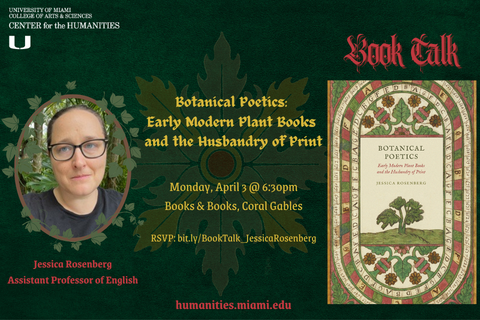
Monday, April 3, 2022 at 6:30 PM
Jessica Rosenberg
Assistant Professor, English
University of Miami
Botanical Poetics: Early Modern Plant Books and the Husbandry of Print
During the middle years of Queen Elizabeth’s reign, the number of books published with titles that described themselves as flowers, gardens, or forests more than tripled. During those same years, English printers turned out scores of instructional manuals on gardening and husbandry, retailing useful knowledge to a growing class of literate landowners and pleasure gardeners. Both trends, Jessica Rosenberg shows, reflected a distinctive style of early modern plant-thinking, one that understood both plants and poems as composites of small pieces—slips or seeds to be recirculated by readers and planters.
Botanical Poetics brings together studies of ecology, science, literary form, and the material text to explore how these developments transformed early modern conceptions of nature, poetic language, and the printed book. Drawing on little-studied titles in horticulture and popular print alongside poetry by Shakespeare, Spenser, and others, Rosenberg reveals how early modern print used a botanical idiom to anticipate histories of its own reading and reception, whether through replanting, uprooting, or fantasies of common property and proliferation. While our conventional narratives of English literary culture in this period see reading as an increasingly private practice, and literary production as more and more of an authorial domain, Botanical Poetics uncovers an alternate tradition: of commonplaces and common ground, of slips of herbs and poetry circulated, shared, and multiplied.
Jessica Rosenberg is Associate Professor of English at the University of Miami. She specializes in early modern literature and culture, with a particular focus on the history of science and the history of the book. She received her PhD in Comparative Literature from the University of Pennsylvania and MPhil in History and Philosophy of Science from Cambridge.
 for recording!
for recording!
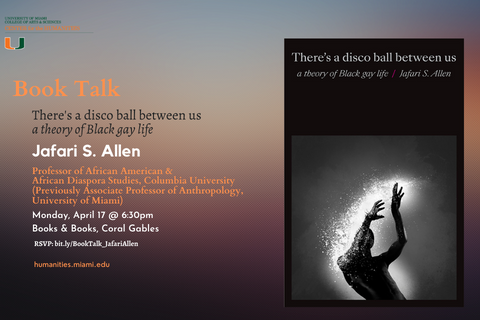
Monday, April 17, 2023 at 6:30 PM
Jafari Allen
Professor of African American & African Diaspora Studies, Columbia University (Previously Associate Professor of Anthropology and Director of the Center for Global Black Studies, University of Miami)
There's a Disco Ball Between Us: A Theory of Black Gay Life
In There’s a Disco Ball Between Us, Jafari S. Allen offers a sweeping and lively ethnographic and intellectual history of what he calls “Black gay habits of mind.” In conversational and lyrical language, Allen locates this sensibility as it emerged from radical Black lesbian activism and writing during the long 1980s. He traverses multiple temporalities and locations, drawing on research and fieldwork conducted across the globe, from Nairobi, London, and Paris to Toronto, Miami, and Trinidad and Tobago. In these locations and archives, Allen traces the genealogies of Black gay politics and cultures in the visual art, poetry, film, Black feminist theory, historiography, and activism of thinkers and artists such as Audre Lorde, Marsha P. Johnson, Essex Hemphill, Colin Robinson, Marlon Riggs, Pat Parker, and Joseph Beam. Throughout, Allen renarrates Black queer history while cultivating a Black gay method of thinking and writing. In so doing, he speaks to the urgent contemporary struggles for social justice while calling on Black studies to pursue scholarship, art, and policy derived from the lived experience and fantasies of Black people throughout the world.
Jafari S. Allen is Professor of African American & African Diaspora Studies, Columbia University (Previously Associate Professor of Anthropology and Director of the Center for Global Black Studies at the University of Miami University of Miami) as well as author of ¡Venceremos? The Erotics of Black Self-making in Cuba, also published by Duke University Press.



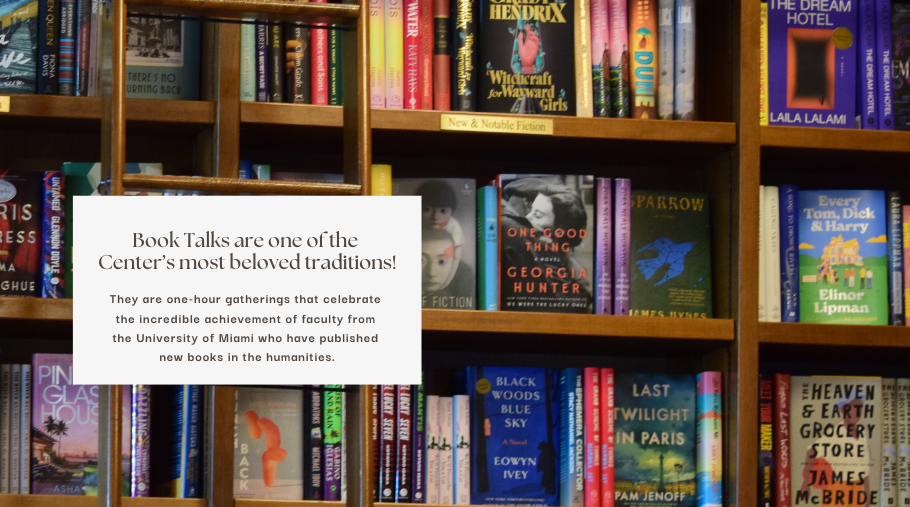
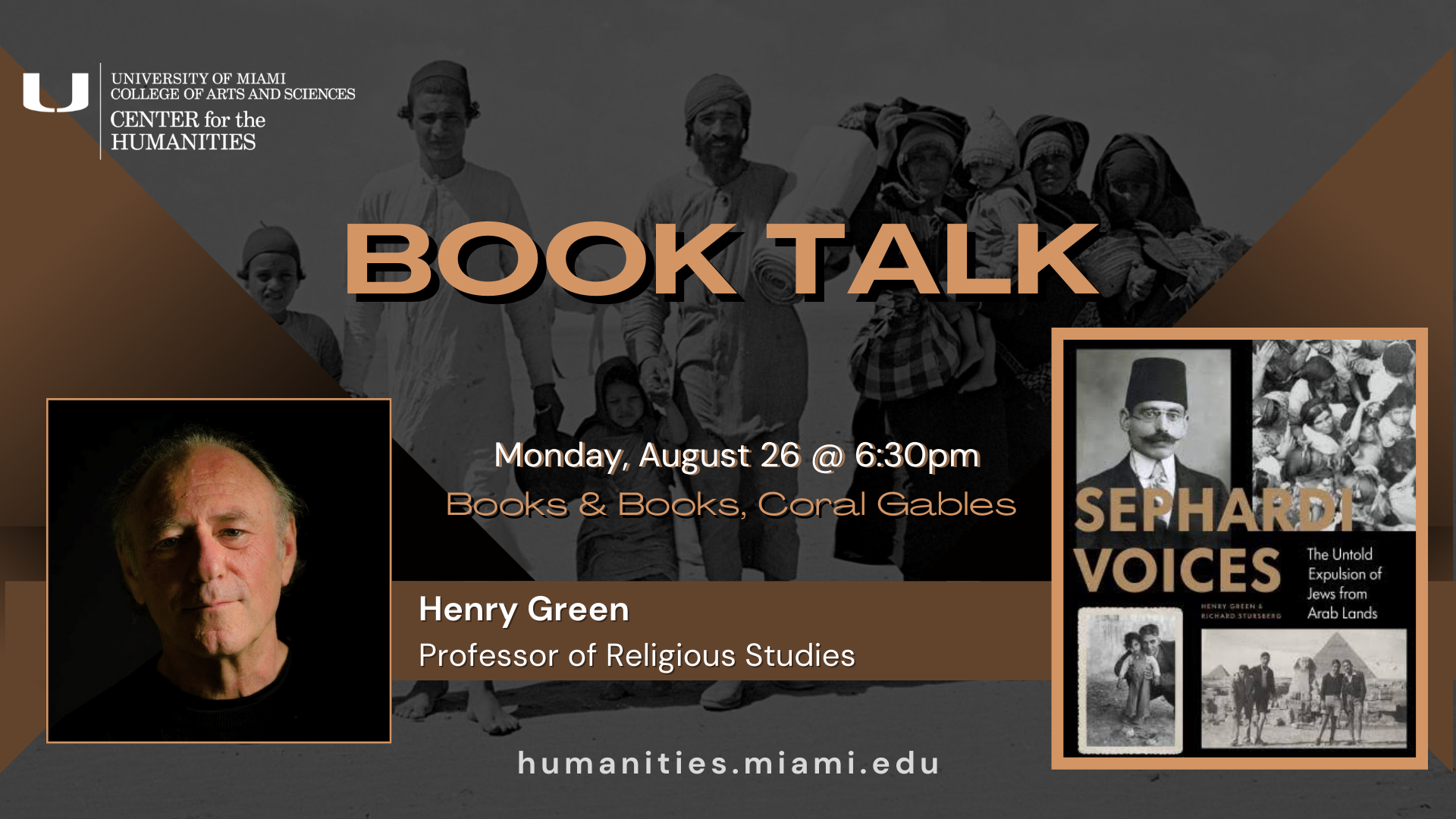


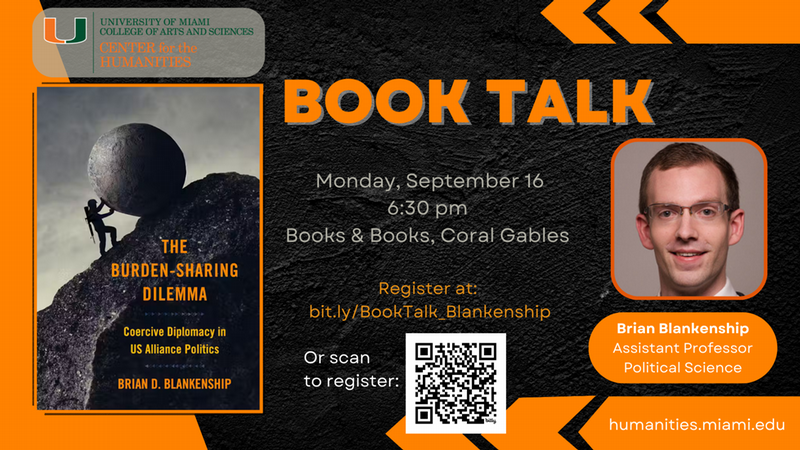
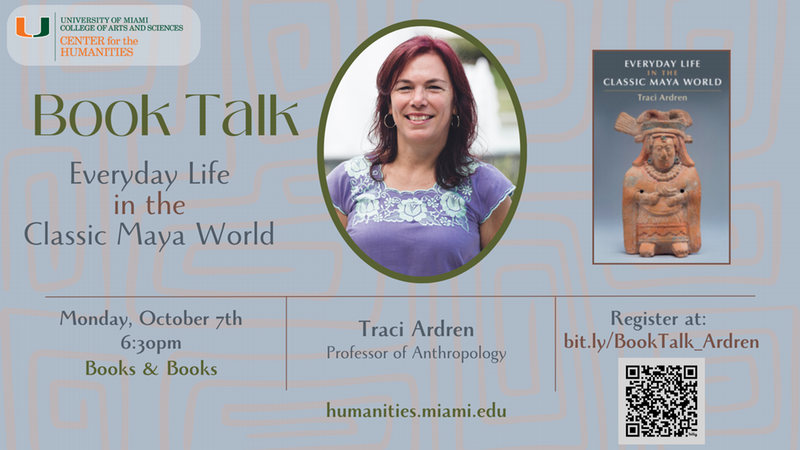
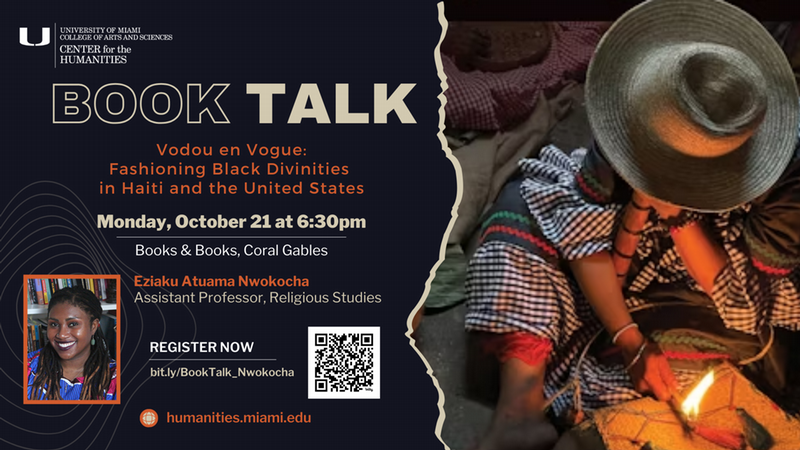
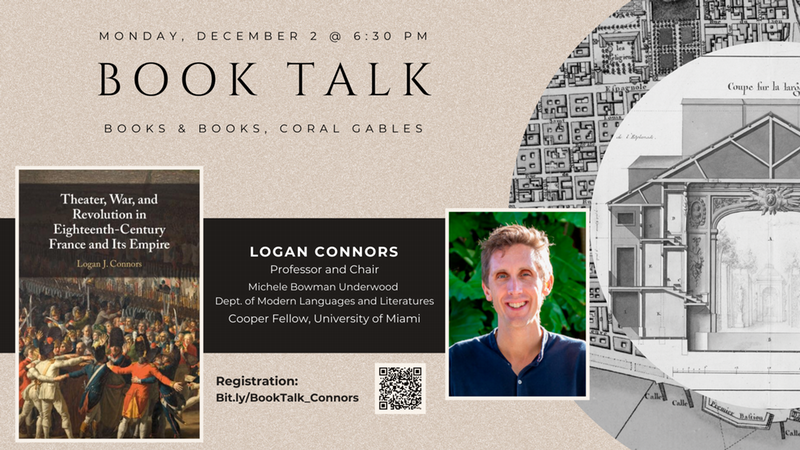
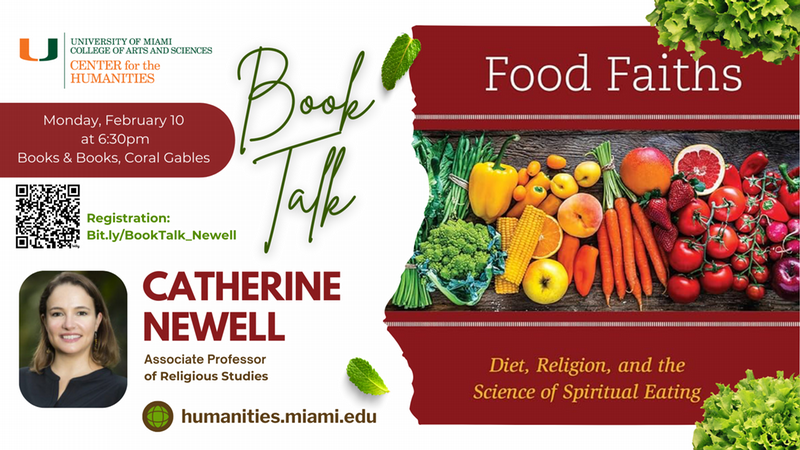
 Catherine L. Newell is a scholar of religion and science, focusing on the intersection of scientific knowledge and religious belief. Her research examines how various religious traditions engage with scientific concepts, particularly in areas such as bioethics, environmentalism, and the history of medicine. Newell's work – including her books Destined for the Stars (U of Pittsburgh 2019) and Food Faiths (Lexington 2023) – explores the historical and contemporary interactions between science and religion, emphasizing both conflict and cooperation with particular emphasis on how science, spirituality, religion, and ethics can work together to address pressing global challenges.
Catherine L. Newell is a scholar of religion and science, focusing on the intersection of scientific knowledge and religious belief. Her research examines how various religious traditions engage with scientific concepts, particularly in areas such as bioethics, environmentalism, and the history of medicine. Newell's work – including her books Destined for the Stars (U of Pittsburgh 2019) and Food Faiths (Lexington 2023) – explores the historical and contemporary interactions between science and religion, emphasizing both conflict and cooperation with particular emphasis on how science, spirituality, religion, and ethics can work together to address pressing global challenges.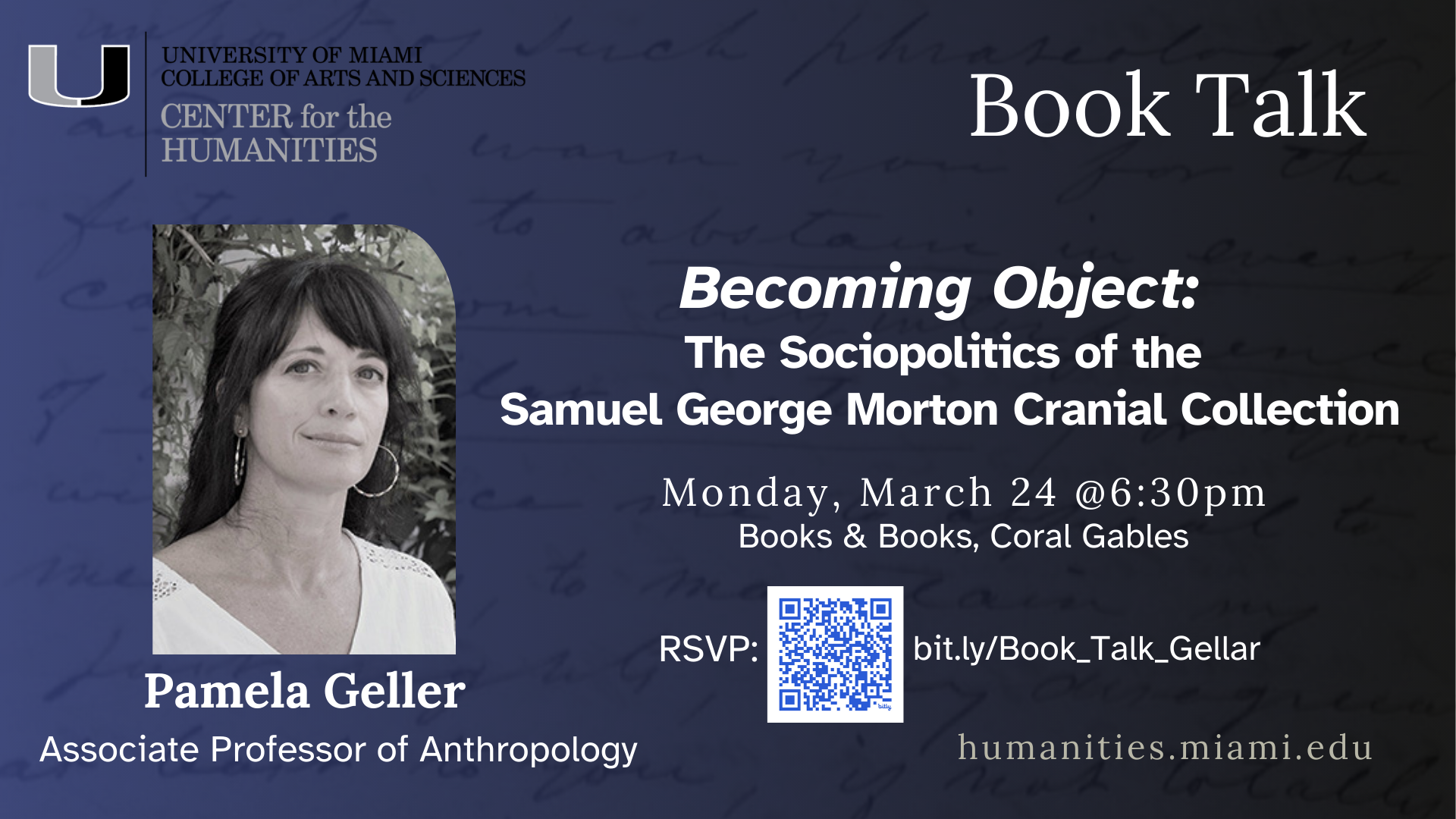

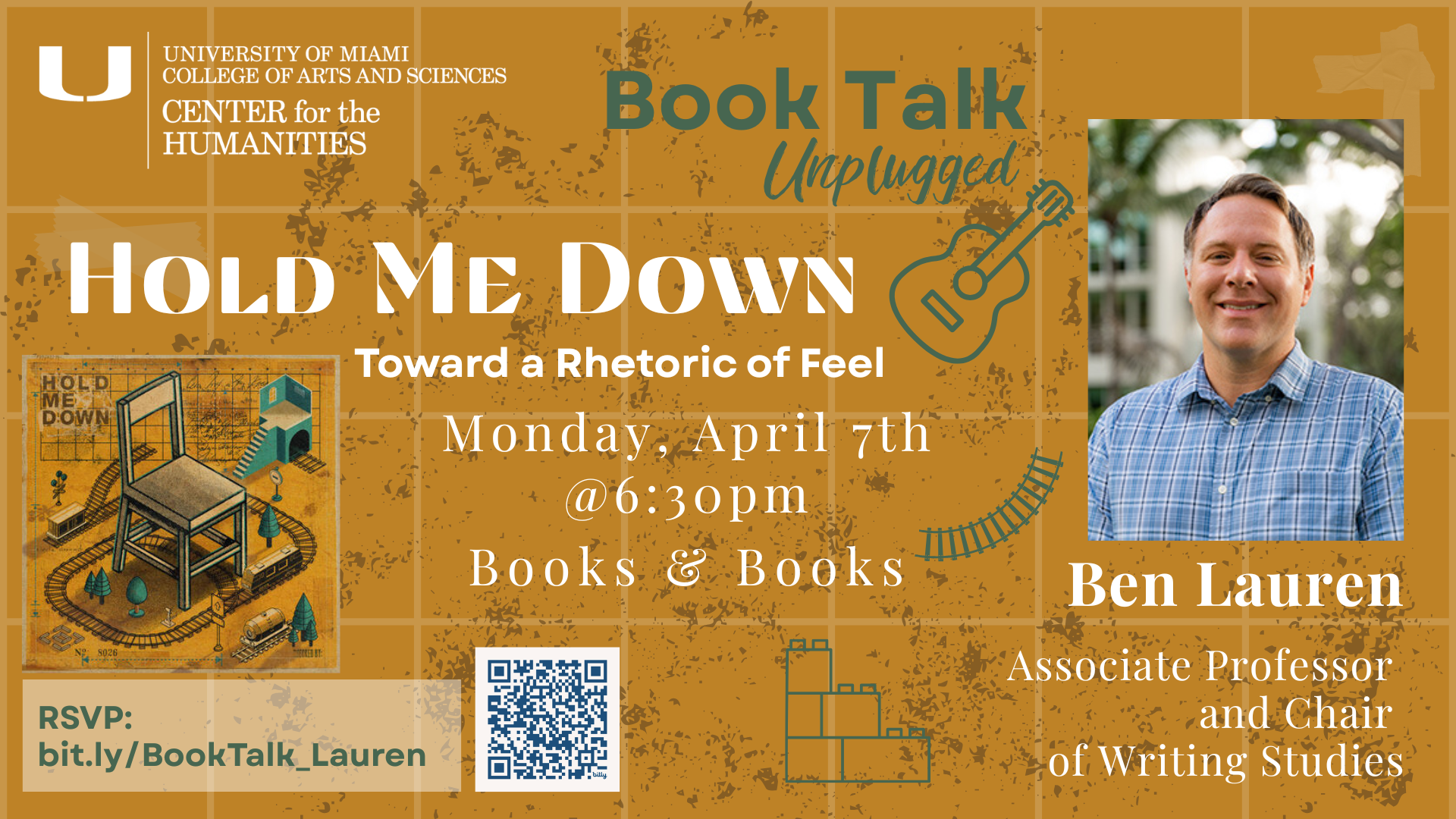

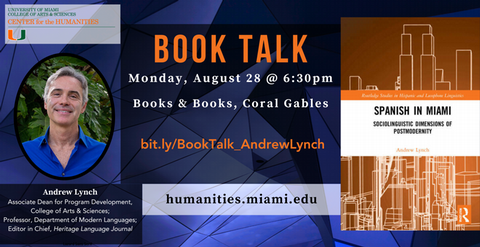

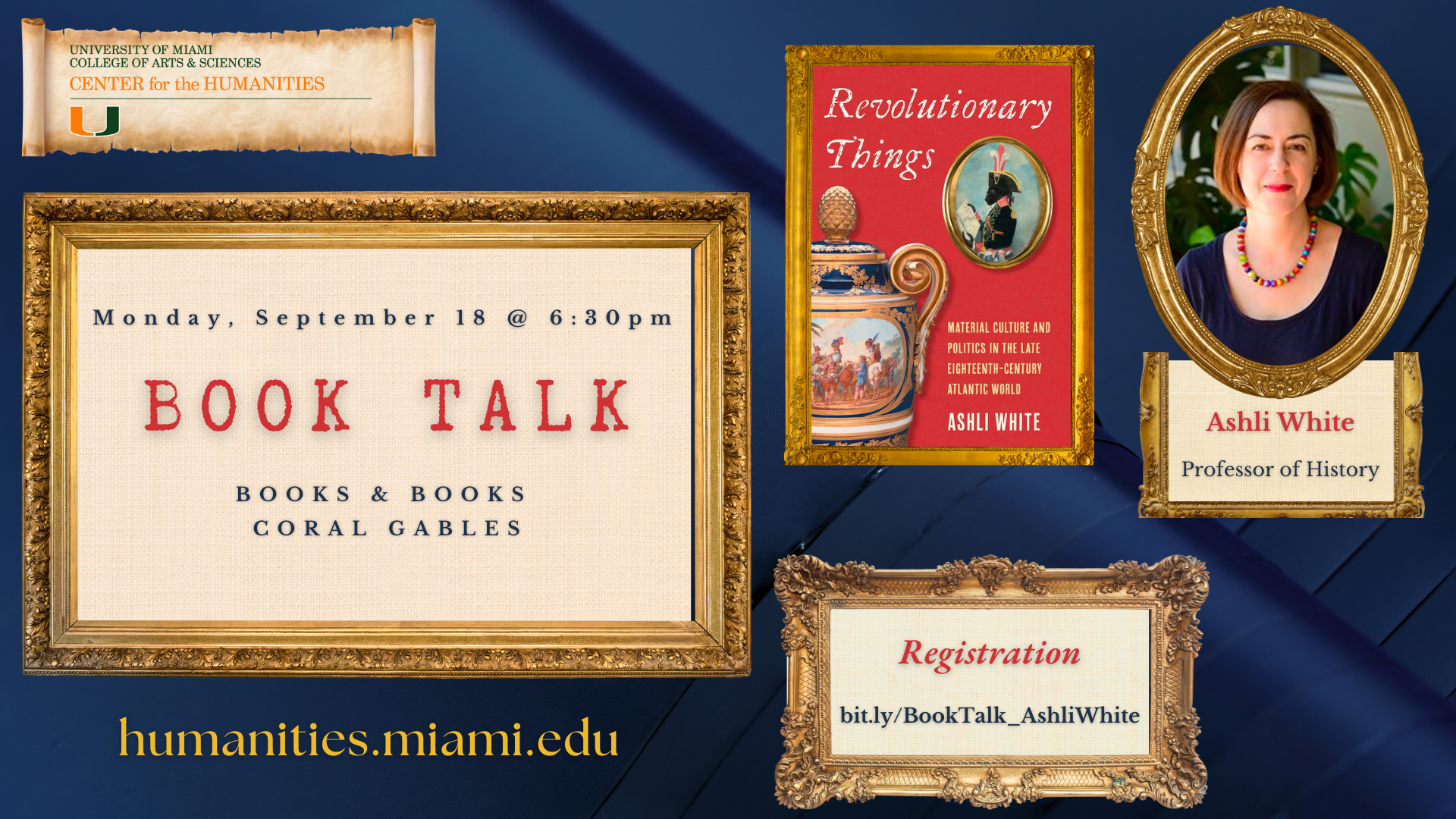
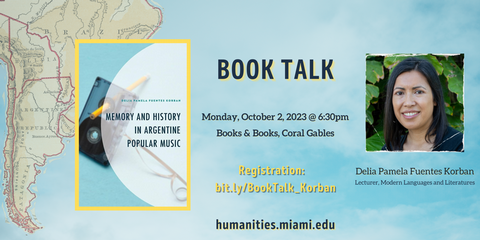
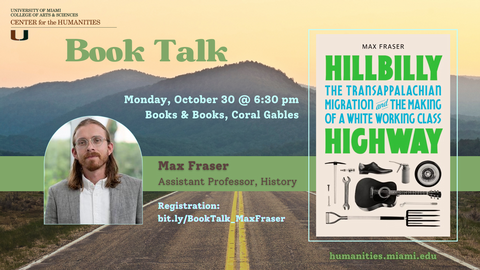

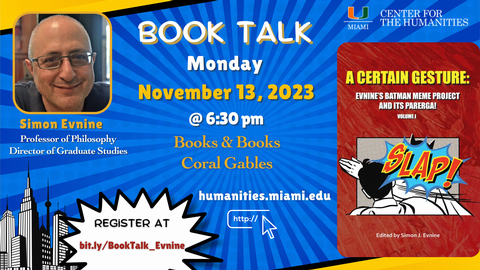
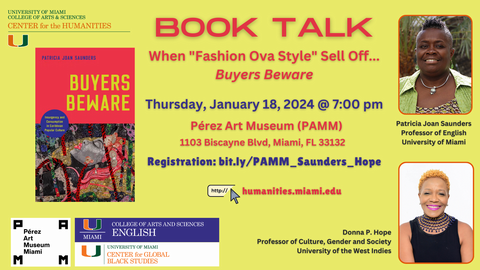
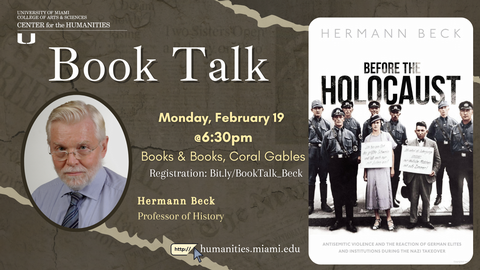
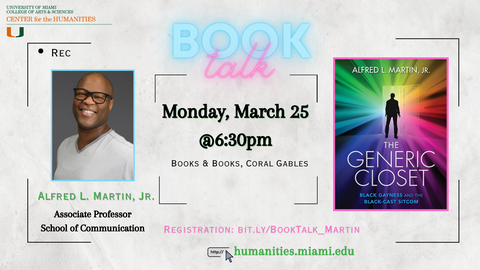
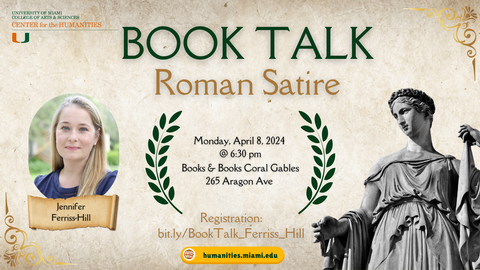
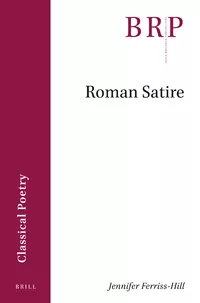









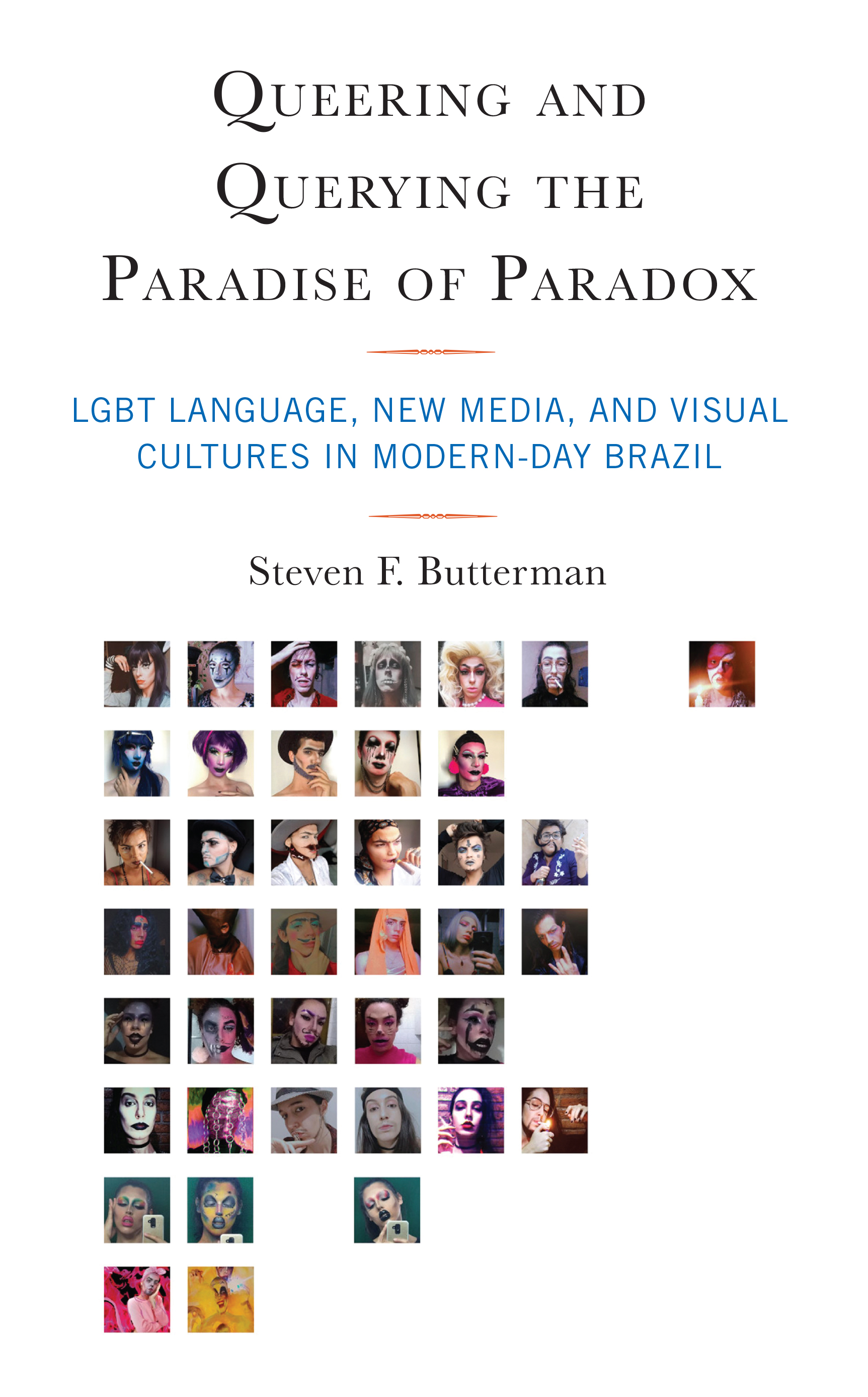
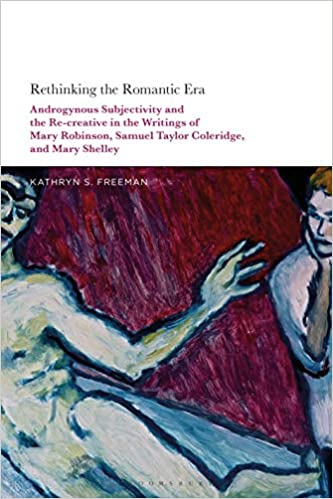
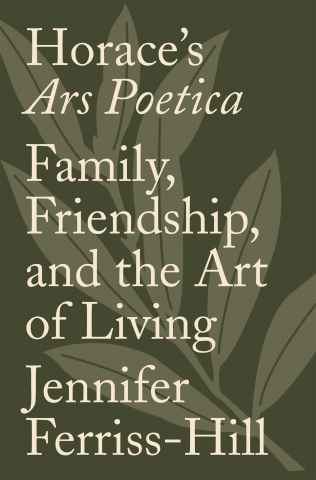 Wednesday, September 16, 2020 at 8:00 PM
Wednesday, September 16, 2020 at 8:00 PM Wednesday, October 7, 2020 at 8:00 PM
Wednesday, October 7, 2020 at 8:00 PM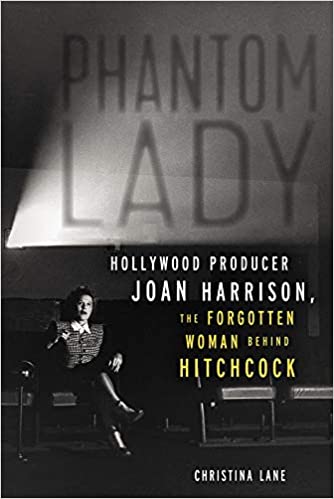 Wednesday, October 28, 2020 at 8:00 PM
Wednesday, October 28, 2020 at 8:00 PM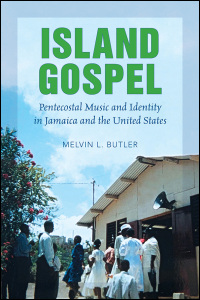 Wednesday, November 18, 2020 at 8:00 PM
Wednesday, November 18, 2020 at 8:00 PM Wednesday, December 9, 2020 at 8:00 PM
Wednesday, December 9, 2020 at 8:00 PM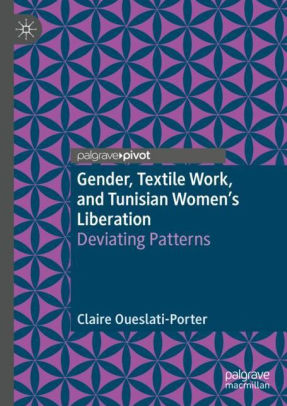 Wednesday, Januay 20, 2021 at 8:00 PM
Wednesday, Januay 20, 2021 at 8:00 PM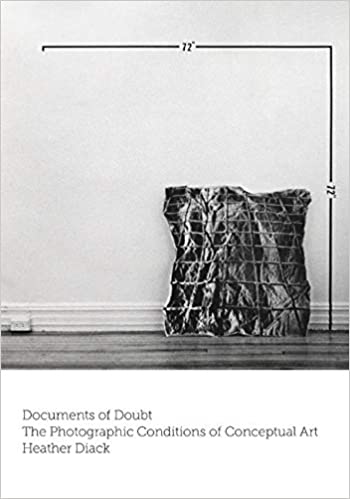 Wednesday, February 10, 2021 at 8:00 PM
Wednesday, February 10, 2021 at 8:00 PM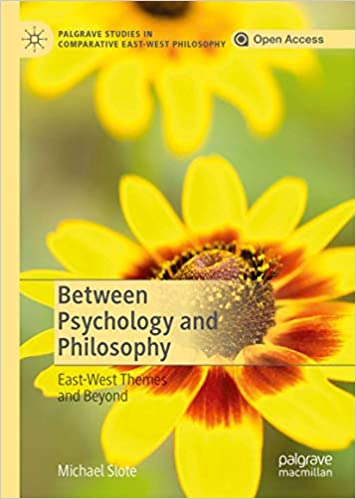 Wednesday, March 3, 2021 at 8:00 PM
Wednesday, March 3, 2021 at 8:00 PM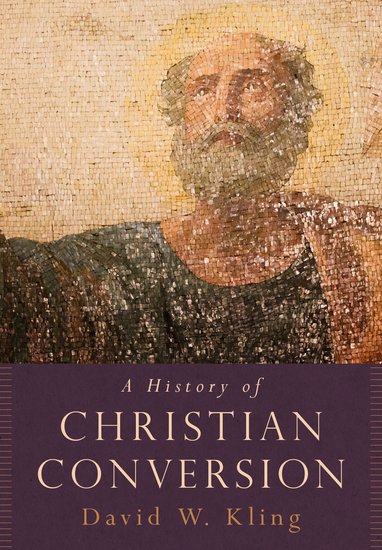 Wednesday, March 24, 2021 at 8:00 PM
Wednesday, March 24, 2021 at 8:00 PM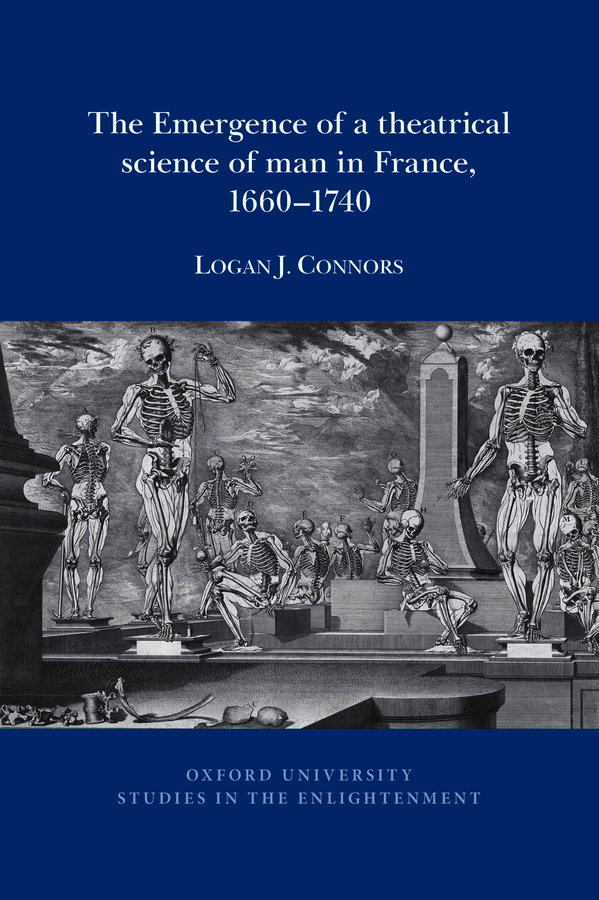 Wednesday, April 14, 2021 at 8:00 PM
Wednesday, April 14, 2021 at 8:00 PM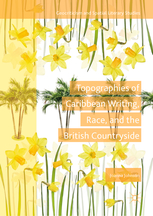
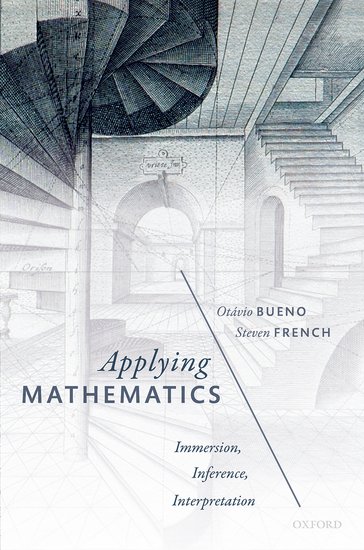
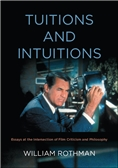
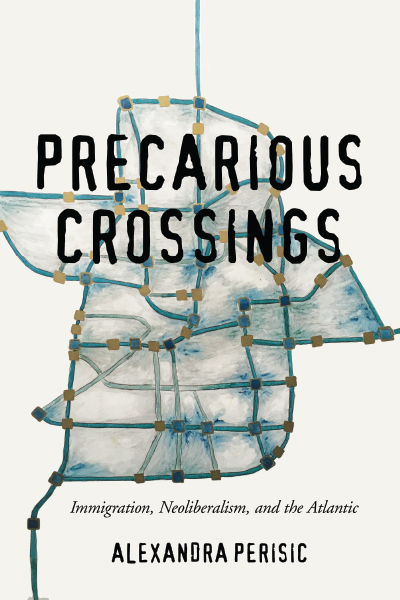
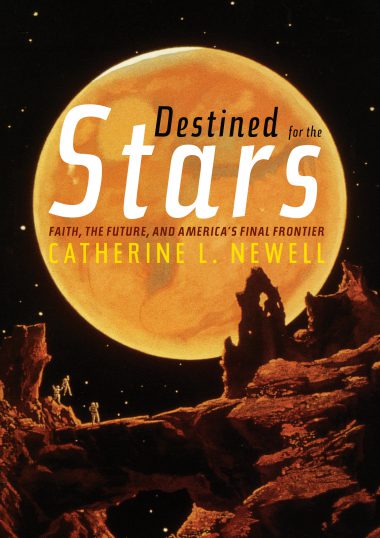 Wednesday, January 22, 2020 at 8:00 PM
Wednesday, January 22, 2020 at 8:00 PM